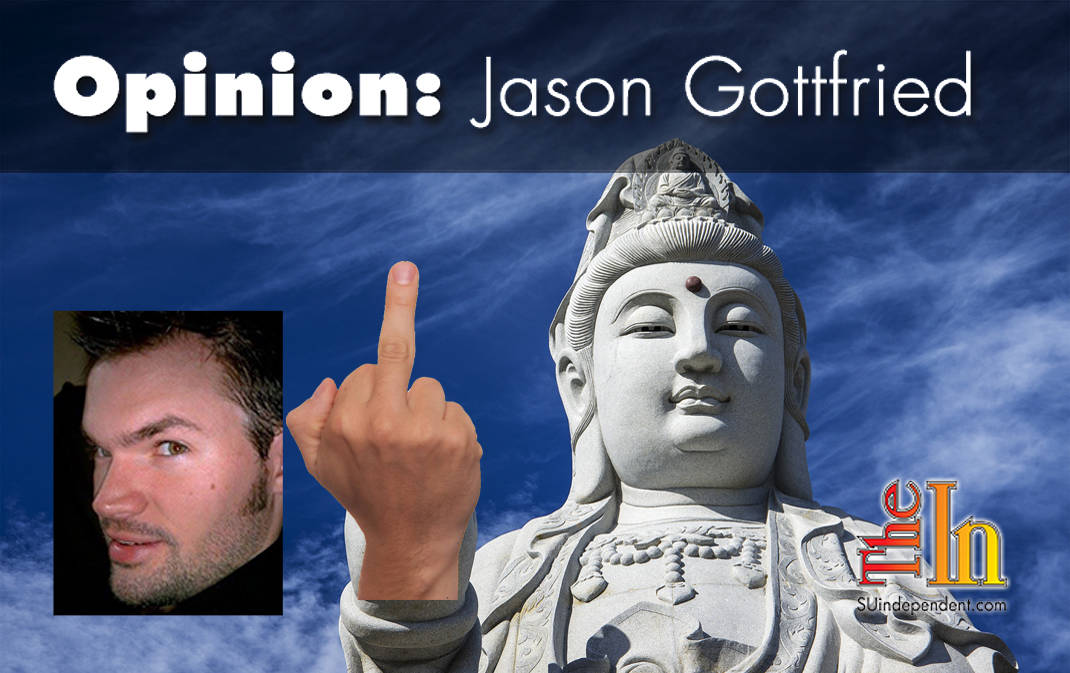
We operate within a vast sea of isomorphisms during every moment of life, yet they really exist only in our minds.
If more people realized that they are getting offended by abstract and inherently meaningless isomorphic elements arranged in complex ways by their own minds, I think they would spend less time being offended by things. And I think they would spend less time worrying about “bad words” and more time teaching kids cuss words. After all, we have a beautiful language full of some of the most succulent vulgarities human civilization has created.
Lately, the interwebs are agog (as the interwebs are wont to be) over a word that we are all now supposed to tiptoe around: “p***y.” I can say vagina, snatch, fish taco, hatchet wound, roast beef, whisker biscuit, hot pocket, ninja foot, and bearded clam — but sweet Shiva help me if I fill in the asterisks. And we’re all worried about the children, even the ones with p*****s. It’s silliness! It’s just a lil’ old word.
What in the flying fuck are isomorphisms?
Over a decade before encountering Zen Buddhism, I first learned about isomorphisms from Douglas F. Hofstadter’s “Godel, Escher, Bach: An Eternal Golden Braid.” It was recommended to me by my composition teacher after he had premiered “Strange Loops,” a piece inspired by the strange loops explored in the book. He suggested the book to me as his student not only because of the inclusion of J.S. Bach in the discussions; it’s also about math, logic, language, paradox, art, and ultimately the beauty of thought and meaning. It’s an intellectual tour de force if there ever was one. (There was one. It’s this book.)
In “Godel, Escher, Bach: An Eternal Golden Braid,” Hofstadter postulates that “symbols of a formal system, though initially without meaning, cannot avoid taking on a ‘meaning’ of sorts, at least if an isomorphism is found.”
You may be tempted to Google “isomorphism.” Don’t, or you’ll get a bunch of math. And then you’ll be cussing. Or hey, if you are into math, go for it. Hofstadter’s lay definition is gentler: “an information-preserving transformation.”
Here’s a quick explanation using Hofstadter’s example: “The string ~~p~~~q~~~~~ is a theorem because 2 plus 3 equals 5.” We get the impression that “~~p~~~q~~~~~” could mean “2+3=5” because there is an isomorphism between this pq-theorem and addition. P could be taken to function as “plus,” “q” could mean “equals,” and the tildes are units to be counted.
So “~~p~~~q~~~~~” could be interpreted to mean “2+3=5,” but it doesn’t inherently mean that. And that’s an isomorphism.
Hofstadter then asks what happens if “p” is interpreted as “horse,” “q” is interpreted as “apple,” and “~” is interpreted as “happy.” Through this lens, the pq-theorem becomes a lovely bit of horse poetry — which I, for one, am rather into.
Then Hofstadter demonstrates the difference between inherent meaning and interpretation by proposing that “p” means “equals” and that “q” means “taken from.” Seen this way, the pq-theorem still makes sense because it’s a genuine theorem, but the meaning is a little different.
Like the word “pussy,” “~~p~~~q~~~~~” has no real meaning in and of itself, but meaning can be assigned to it through isomorphic interpretations. Those potential meanings could be variously upsetting, but they’re all in your head.
Hofstadter is talking about formal systems. The English language is a formal system, as is any language. As such, no aspect of it inherently has any meaning whatsoever. We derive meaning from it through systems of isomorphic association.
 What the fuck is my point?
What the fuck is my point?
Think about a red octagon. What does it mean?
I would guess that most people, if they gave a knee-jerk response when asked what a red octagon means, would say that it means “stop.”
Clearly, it does not. It’s just a red octagon.
In and of itself, it doesn’t mean anything.
Consider this.
FUCK
The above combination of symbols could be taken to mean a wide variety of things depending on who has encountered it, but it is just as inherently meaningless as a red octagon. Who knows what it means in Russian or Dutch? Who knows what it means to cats? (Cats are nihilists, it means nothing to them.)
Just as “~~p~~~q~~~~~” could be interpreted to mean “2+3=5,” “2=5-3,” or “happy happy horse happy happy happy apple happy happy happy happy happy,” so could “fuck” be interpreted to mean a variety of things. But in either case, the element under scrutiny is inherently meaningless.
In language, we have rules for pronunciation that allow us to interpret this combination of symbols as sound, and there are systems of isomorphisms working within more complex systems of isomorphisms to create what we call “meaning.” Hence, when I type “fuck,” you think you know what I mean. What you may not realize is that I just now ran out of coffee.
We get into trouble when we start assigning soft, passive meanings to words — not literal meanings but moral or ethical interpretations. This is where we depart from actual reality and enter the world of conditioned response and situational ethics. It’s also where people start getting offended.
“Fuck” is a “bad word,” yet complex systems of interrelating isomorphisms are inherently meaningless and therefore inherently amoral and ethically neutral.
So why do people lie to children and tell them that some words are bad? For shame. It’s totally false. As pure abstractions interpreted in context, words are neither good nor bad. They are incapable of moral implication in and of themselves.
Consider this statement: “Shit the bed, Martha! This cake is dank as fuck!”
Uh-oh! Bad words! Look out!
Consider this statement: “Martha, I detest you. You are ugly and bad and entirely devoid of merit or worth. I will celebrate your death with a delicious cake.”
Yay! No bad words! Good times!
Teaching kids cuss words
I was taught that cuss words were bad. I was also taught inconceivable volumes of sheer nonsense, historical distortions, fantastical delusions, and outright lies.
My 5-year-old daughter knows the entry-level cuss words: “damnit” and “shit.” I taught them to her. Not when I dropped something on my foot, although she is observant. I taught them to her on purpose because I knew she was going to encounter them sooner or later. (I’m holding off on “fuck” so that I don’t have to explain the mechanics of procreation just yet beyond saying that many organisms must trade information to create new organisms.)
I taught these to her before she went to school so that I could preemptively emancipate language for her before the public school system began its self-appointed job of miseducating her about it. I think it’s more important for her to know the truth and learn to think than to mindlessly adopt to social mores — and if you love your kids, you should do the same.
But it’s also important to inform kids about social mores. Otherwise, they wouldn’t be able to function in society. It’s just that it’s important to teach them that they are arbitrary.
Let me return to my sample statements.
 “Shit the bed, Martha! This cake is dank as fuck!”
“Shit the bed, Martha! This cake is dank as fuck!”
That was a compliment. Martha probably feels good about her dank-ass cake-baking skills.
“Martha, I detest you. You are ugly and bad and totally without merit or worth. I will celebrate your death with a delicious cake.”
Martha probably feels terrible. I may have just dealt significant emotional damage to her.
Which is worse, violating a completely arbitrary social code or inflicting emotional damage upon someone?
But in school as well as elsewhere, it’s good to know how to choose one’s words, right? You know that if Martha is a 90-year-old lady, it’s stereotypical to assume so, but chances are that she will cringe when you haul out the sailor talk. And a kindergarten teacher will not be pleased at all if a student tells her that her cake dank as fuck — well, not during school hours, at least. Or she might be pleased about the cake but not with the student.
It’s all in your fucking head
Zen Buddhists frequently chant the Heart Sutra, a central text in Mahayana Buddhism. It’s called the “Heart Sutra” because it contains the core essence of the Buddha’s teachings, distilled into one relatively brief work. Among other things, it states that form is emptiness and emptiness is form. Form is none other than emptiness, and emptiness is none other than form. They are not two different things. This is nonself, one of the three dharma seals: an observable truth that is an inalienable, inarguable, and ubiquitous characteristic of reality. Obviously, the other two dharma seals are death and taxes.
“Emptiness” here doesn’t mean “nothingness.” Far from it. It means emptiness of any inherent self. A table is a table in your mind; that’s form. But really, a table is a conglomeration of protons, neutrons, and electrons that are in perpetual flux. Furthermore, the table is made precisely out of what the rest of the universe is made of: matter and energy. Not only is what you call a table not inherently a table; it’s also not even the same from moment to moment. In your mind, it has a certain tableness about it, but the table has no everlasting self as a table. Not even as wood. That’s why that Buddhist kid in “The Matrix” said there was no spoon.
The same is true of language. Words have no inherent selves. Like sandcastles or waves, they are patterns made up of patterns. The characters that make up the patterns are arbitrary. Language is inherently empty, yet in our minds — but only in our minds — it takes on meaning.
When we realize that life is really more of a dream than our egos and thinking minds make it out to be, it’s not such a big deal if someone says “fuck” or “pussy” or whatever else gets our panties in a wad. Words are just tools for self-expression; they are not the expressions themselves. So teach kids cuss words — but be sure to teach them when to use or not to use them as well as about isomorphisms, nonself, and the inherent meaninglessness of language. This can help them to avoid the self-inflicted suffering of delusion.
After all, you don’t want them to fucking suffer.
Articles related to “Isomorphism, Zen, and teaching kids cuss words”
The laws of man vs. the laws of God: Can you think beyond your religion?
A word is a word: musings on offensive language in public forums



